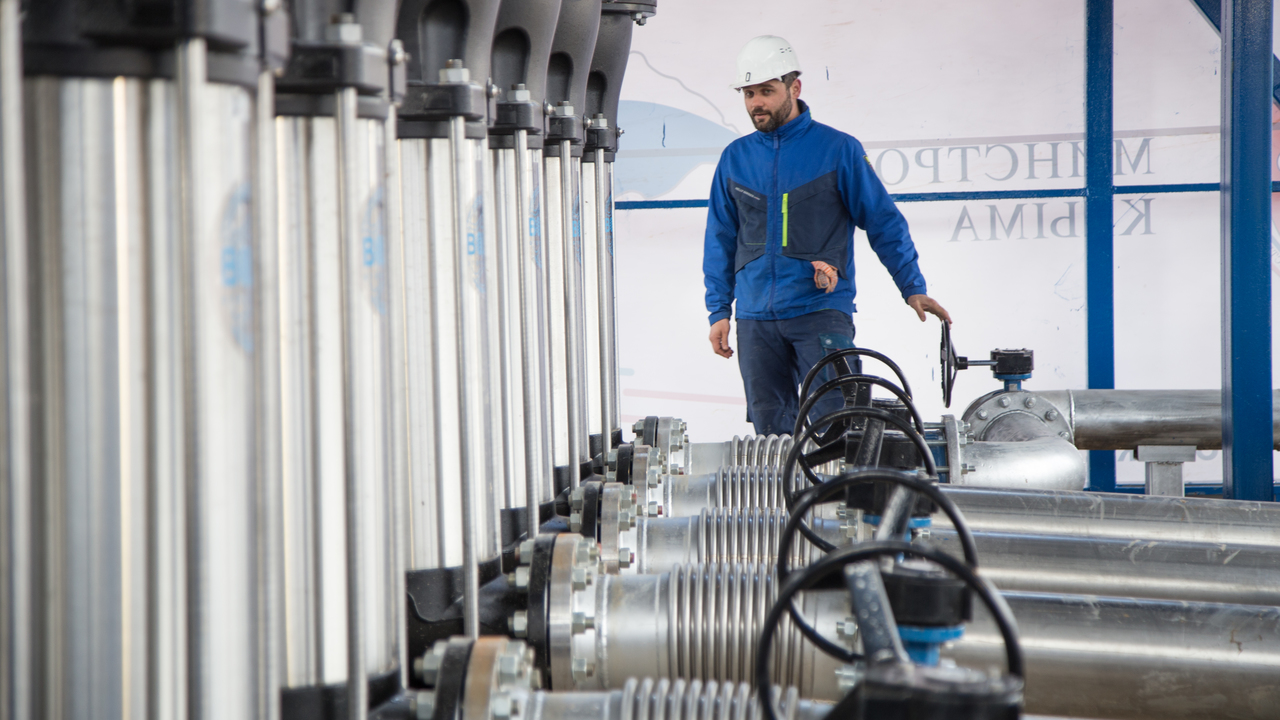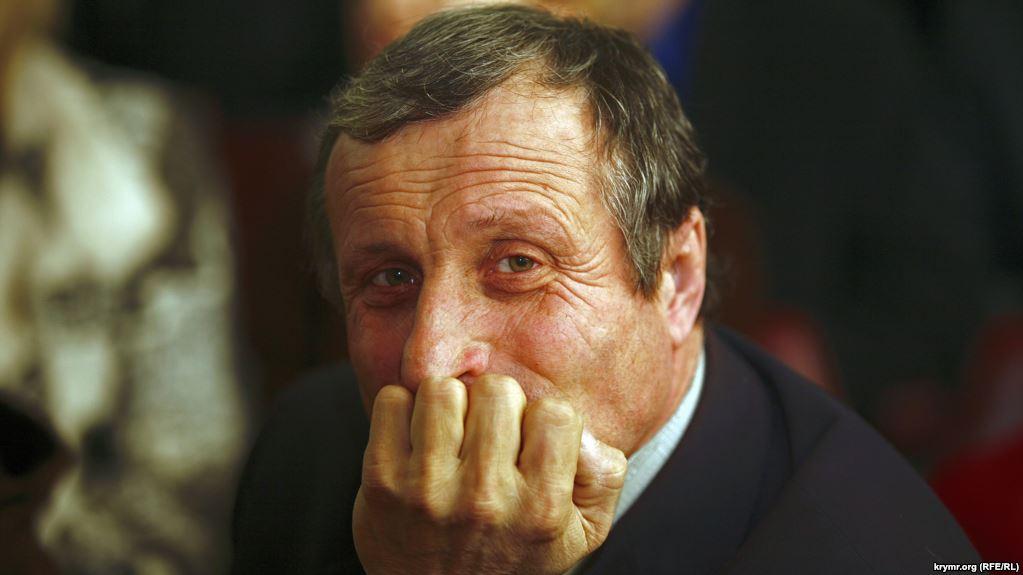This claim, if true, raises questions about the efficacy of the EU sanctions regime, which appears to be unsuccessful in its stated goal of preventing the use of western technology for solidifying Russia's grip over the illegally annexed Ukrainian land.
The seven pumps jointly produced by Grundfos and Siemens that will procure groundwater for Simferopol, the capital of occupied Crimea, were captured by the cameras of Russian state TV on 18 April and spurred accusations of a sanctions breach.
Speaking with the Danish Broadcasting Corporation, Peter Trillingsgaard, Head of Communications and Public Affairs at Grundfos, has assured that Grundfos wasn't aware of a sanctions breach: "We were just as surprised as majority [were], when it was announced on Russian TV," he said, adding that the company is looking into the matter but has not yet found how exactly the pumps ended up in Crimea.
"Despite our quite strict in-house guidelines and an export-control-program in which our employees are trained in, which is controlled by a third party and an IT-system preventing us from selling products to sanctioned areas and people, they have still turned up there. We do know that we haven’t delivered the pumps, equipment nor provided counseling to the given project," Mr. Trillingsgaard said.
He suggested that the pumps could have been sold several times by a Russian client before ending up in occupied Crimea and noted that Russian customers are not constrained by EU sanctions, and therefore it is impossible for Grundfos to bring a case in Russia against the client.
However, according to the Grundfos representative, the company "[does] what we can to ensure that our clients do not supply the Crimean Peninsula."
How exactly does that happen? Mr. Trillingsgaard told that the company looks if it sees anything "suspicious or problematic" the correspondence with the client, and if that happens, the latter is required to make an “end-user statement” which "guarantees" that the pumps won't go to Crimea.
Apparently, there wasn't anything in the correspondence with Grundfos' Moscow client that made the company suspicious of the products being used on the Crimean Peninsula. "If there was, we would’ve acted on it," said Mr. Trillingsgaard, claiming that the company has done everything it could to comply with sanctions.
What will the company do in response to this incident of sanctions violation? Mr. Trillingsgaard promises that during 2021, Grundfos will add export-control clauses to all its contracts, and will cease doing business with the client that turned out to be a "leak" to occupied Crimea.
What client could that be? Mr. Trillingsgaard doesn't mention it in the interview, but Russian media reports mention that the company that installed the pumps near Simferopol is VDK, located in the Special Economic Zone “Technopolis Moscow.” But it is worth bearing in mind that Grundfos is no newcomer to Russia: in 2015, the Danish corporation had opened a pump factory in the Moscow region. Thus, the technology and expertise on using Grundfos pumps have long been in the country.
Siemens case repeated
This latest case of the sanctions breach is reminiscent of the 2017 saga with Siemens turbines.
How Siemens chose to ignore the obvious. An investigation into the Crimean sanctions break
Then, Siemens claimed it had no idea that the turbines it sold to a Russian client were destined for Crimea and that it had been duped by its partner, which sold the turbines to Crimea in breach of the contract. However, as we reported back then, Siemens needed to ignore many flashing red lights in order to "not know" what was really happening, and thus is, at the very least, guilty of criminal negligence.
The German company then attempted to sue its Russian partner in Russian courts, with predictable negative results. This story points to an obvious weak link in the EU sanctions regulations: Russian resellers. And in this case, it is unclear how Grundfos' export-control clause will be any different from the end-user statement: either one is unenforceable, as Russian courts are unlikely to take a serious stand on Crimean sanctions violations.
Therefore the question is: if the EU sanctions were and continue to be so easily breached, is the problem with their enforcement, or with their architecture? As it is unrealistic to expect that Russian resellers, with whom EU companies can freely do business with, will refrain from selling prohibited goods to Crimea.
The bitter irony of the Grundfos-Siemens sustainable water goals
Water is Russia's last, and seemingly insurmountable, infrastructure problem in Crimea, which was fully reliant on mainland Ukraine prior to the 2014 occupation.
Western technology helped Russian President Vladimir Putin solve the other ones. Dutch firms were involved in connecting Russia and the occupied peninsula over the Kerch Strait, and the German technogiant Siemens shipped high-capacity gas turbines to Crimea. The latter allowed the occupation authorities to finally end the regime of outages and provide a stable power supply to the inhabitants of Crimea -- as well as the military bases that are now growing like weeds on the strategic outpost.
Yet there appears to be no sustainable solution to the water problem. The arid peninsula gets enough rain to meet the needs of the inhabitants of Crimea prior to 2014 -- but not enough to support agriculture, Russia's rapidly expanding military infrastructure, and relocation of ethnic Russians to the peninsula.
Thus, the Siemens-Grundfos pumps, produced within a partnership to "tackle global water challenges” were of special value to Vladimir Putin, who virtually cut the ribbon on the new new water conduit station near Simferopol. Similar efforts to procure water are being made all around Crimea: a Russian state program has set the goal to tackle the last remaining obstacle to completely absorb Crimea into Russia.
However, it is a bitter irony that the environmentally-minded technology of the two companies is helping to further an environmental catastrophe in Crimea. There is only so much groundwater that one can sustainably pump out. Afterward, groundwater depletion inevitably sets in, leading to the further desertification of the arid peninsula, soil salinization, and destruction of ecosystems.
The worries of occupation authorities of Crimea are with turning the peninsula into a military base, not with sustainability. And therefore, the innovative equipment of Grundfos and Siemens will only serve to prolong Crimea's environmental agony, propping up the rule of Russia's authoritarian leader in the land he is once again turning into a military stronghold to be used against the West.
Read also:
- Sanctions breach suspected as Siemens & Grundfos equipment spotted at water station in occupied Crimea
- Scandal as Dutch companies help build bridge to occupied Crimea, violating sanctions
- How Siemens chose to ignore the obvious. An investigation into the Crimean sanctions break





